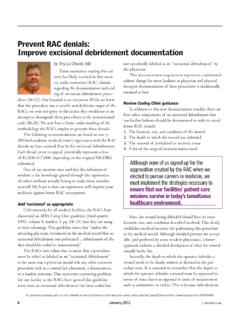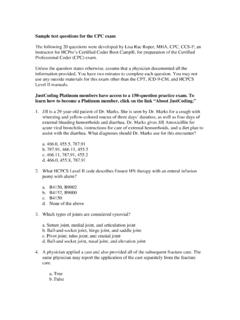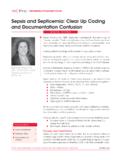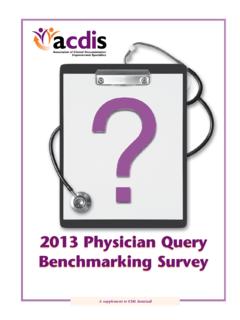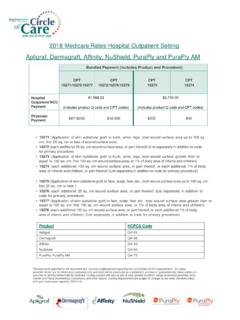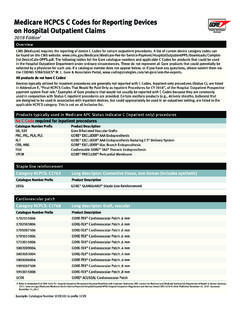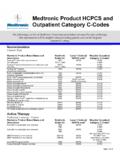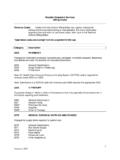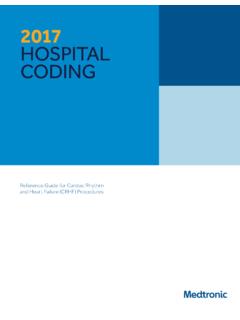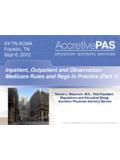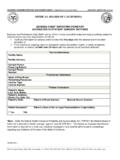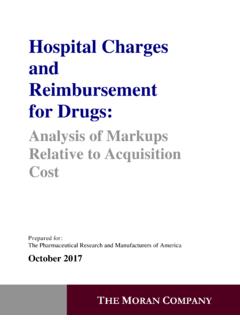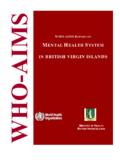Transcription of Outpatient Observation Frequently Asked Questions
1 Outpatient Observation Frequently Asked Questions 1: Under what circumstances is use of Outpatient Observation appropriate? A: Use of Outpatient Observation is appropriate when: 1. The physician is unsure about the patient's need for inpatient admission and requires additional time to evaluate the patient;. 2. The physician anticipates that the patient's condition can be evaluated/treated within 24. hours and/or rapid improvement of the patient's condition can be anticipated within 24. hours. (February 2006). 2: What types of services would/would not qualify for Outpatient Observation ?
2 A: Although the reimbursement for Outpatient Observation has changed, the rules for use of Observation have not changed. There must be medical necessity of Observation services and the medical necessity must be documented in the medical record. Routine stays following late surgery, diagnostic testing, or Outpatient therapy/procedures may not be billed as Observation unless there is documentation that the patient's condition is unstable. Normal postoperative recovery time following surgery cannot be billed as an Outpatient Observation .
3 (February 2006). 3: Would it be permissible for a hospital to routinely care for all patients in Outpatient Observation prior to making a decision about their need for inpatient admission? A: No. It is the responsibility of the admitting physician to make a decision at the time of admission about the patient's condition and the level of services required. When it is clear to the admitting physician that the patient requires an inpatient level of care, the provision of these services should not be delayed. (February 2006).
4 4: How should the physician word the order for Outpatient Observation versus inpatient admission? A: The physician should clearly state the level of services that is being ordered ( , "Place in Outpatient Observation " or "Admit as inpatient ). (February 2006). 5: When should Observation orders be written? A: Physician orders for Outpatient Observation must be written prior to the initiation of Observation services. Orders may not be backdated. (February 2006). 6: If a hospital determines within a short period of time after admitting a patient that although the patient was acute on admission he or she has responded rapidly to treatment and is no longer acute, should the hospital bill the stay as an Outpatient Observation in order to prevent denial of a short stay/medically unnecessary admission?
5 A: No. Hospitals, Peer Review Organizations, etc., should not apply "hindsight" in determining medical necessity of admission. If, in the judgment of the admitting physician, a patient has an acute condition that requires treatment in an inpatient setting at the time of admission, the physician should document this in the medical record. If the patient should respond more rapidly to treatment than was anticipated, this should also be documented. The medical record documentation will allow an outside reviewer to determine what the physician was thinking at the time of admission and understand that medical necessity for inpatient admission was present.
6 (February 2006). 7: If a hospital determines after admitting a patient that he or she was not acute at the time of admission, should the hospital bill the stay as an Outpatient Observation ? A: If a hospital determines after admitting a patient that he or she did not require an acute level of care, either one of the following could occur: A. Use Condition Code 44, Inpatient Admission Changed to Outpatient , per CMS transmittal 299, CR 3444, dated September 10, 2004. Implementation date: October 12, 2004. "In cases where a hospital utilization review committee determines that an inpatient admission does not meet the hospital's inpatient criteria, the hospital may change the beneficiary's status from inpatient to Outpatient and submit an Outpatient claim (TOBs 13x, 85s) for medically necessary Medicare Part B services that were furnished to the beneficiary, provided all of the following conditions are met: 1.
7 The change in patient status from inpatient to Outpatient is made prior to discharge or release, while the beneficiary is still a patient of the hospital;. 2. The hospital has not submitted a claim to Medicare for the inpatient admission;. 3. A physician concurs with the utilization review committee's decision; and 4. The physician's concurrence with the utilization review committee's decision is documented in the patient's medical record.". The entire episode of care should be treated as though the inpatient admission never occurred and should be billed as an Outpatient episode of care.
8 B. Use provider submitted UB-92 claim form indicating the provider is liable for the inpatient admission or use a corrected UB-92 claim form if a UB-92 has already been submitted if the determination is made after the patient's discharge. (February 2006). 8: If an intern admits a patient as an inpatient and then the staff attending physician determines that the patient should be cared for in Outpatient Observation , can the attending physician change the order from inpatient admission to Outpatient Observation , and can the case then be billed as an Observation case?
9 A: No. If interns at a hospital have privileges to admit patients, and there is a question about medical necessity, the order for the admission should be clarified with the intern at the time of admission. If the patient has already been admitted, and medical necessity was not present at the time of admission. See the answer to question 7 above for more details. If interns do not have the privilege to admit patients, they should not be allowed to write admission orders and the hospital should not accept admission orders from them.
10 (February 2006). 9: If a physician writes a clear admission or Outpatient Observation order and the patient is receiving the level of care ordered, but an error by business office or other staff results in an incorrect level of care designation being noted in the billing system, can this type of clerical transcription or designation error be corrected? A: Yes. A clerical error that involves only an incorrect level of care status being assigned, not a problem with the physician's order or the level of care the patient is receiving, can be corrected so that it is in alignment with the patient's status as ordered by the physician.

